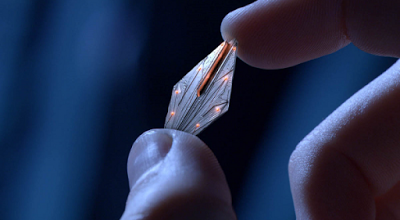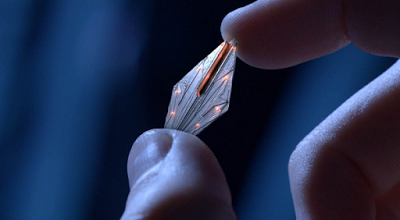Scientists in the United States have created, with the help of nanotechnology, a tiny device that can regenerate damaged or aging tissues, blood vessels, nerve cells and even entire organs with a simple touch on the skin.
This is an important achievement in the field of regenerative medicine.
The nanochip immediately transfers new DNA or RNA to the skin cells, thus changing their function and causing the regeneration of tissues and organs. The device, the size of a small coin, can regenerate almost any type of cell in a patient's body, without first having to turn skin cells into pluripotent stem cells and then into other specialized cells. The conversion is done directly from dermal to specialized cells.
Collaborating researchers at Ohio State University Medical Center and College of Engineering, led by Professors Chadan Sen (Specialist in Regenerative Medicine) and James Lee (Chemical and Biological Engineer) respectively, conducted the relevant publication in the journal Nature. .
"Using a new nanochip technology, damaged or malfunctioning instruments can be replaced. "We have shown that the skin is a fertile ground, where we can develop the components of any organ that has a problem," said Sen.
At present, the method has been successfully tested in experimental animals (mice and pigs). Thanks to the new chip, the scientists were able to reprogram skin cells to turn into blood vessel cells in the legs of severely injured animals, where there was no more blood circulation. Within a week, new blood vessels were regenerated and in the second week blood circulation was restored and the injured lower limbs were saved.
The researchers also reprogrammed skin cells with the help of the nanocip to turn them into nerve cells in the animals' bodies.
These new nerve cells were then implanted in their brains and helped the animals recover from a stroke.
"Although it is difficult to imagine, it is possible and 'works' in 98% of cases. With this technology, we can turn skin cells into components of any organ with a single touch. "The whole procedure takes less than a second and is non-invasive," said Dr. Sen.
The new technology (Tissue NanoTransfection - TNT) is based on the microscopic chip that carries the biological "load" in the body and on the other hand the "load" that causes the conversion of cells from one cell type to another.
The patient almost does not feel the instantaneous operation of the nanodevices, as it touches him, while he does not need to take immunosuppressive drugs.
The researchers plan to start clinical trials in humans in 2018. They hope that their method will be used in the future in many cases that today require complex surgery, in neurodegenerative diseases (Alzheimer's, Parkinson's), but also against premature aging.
Source RES-EIA

